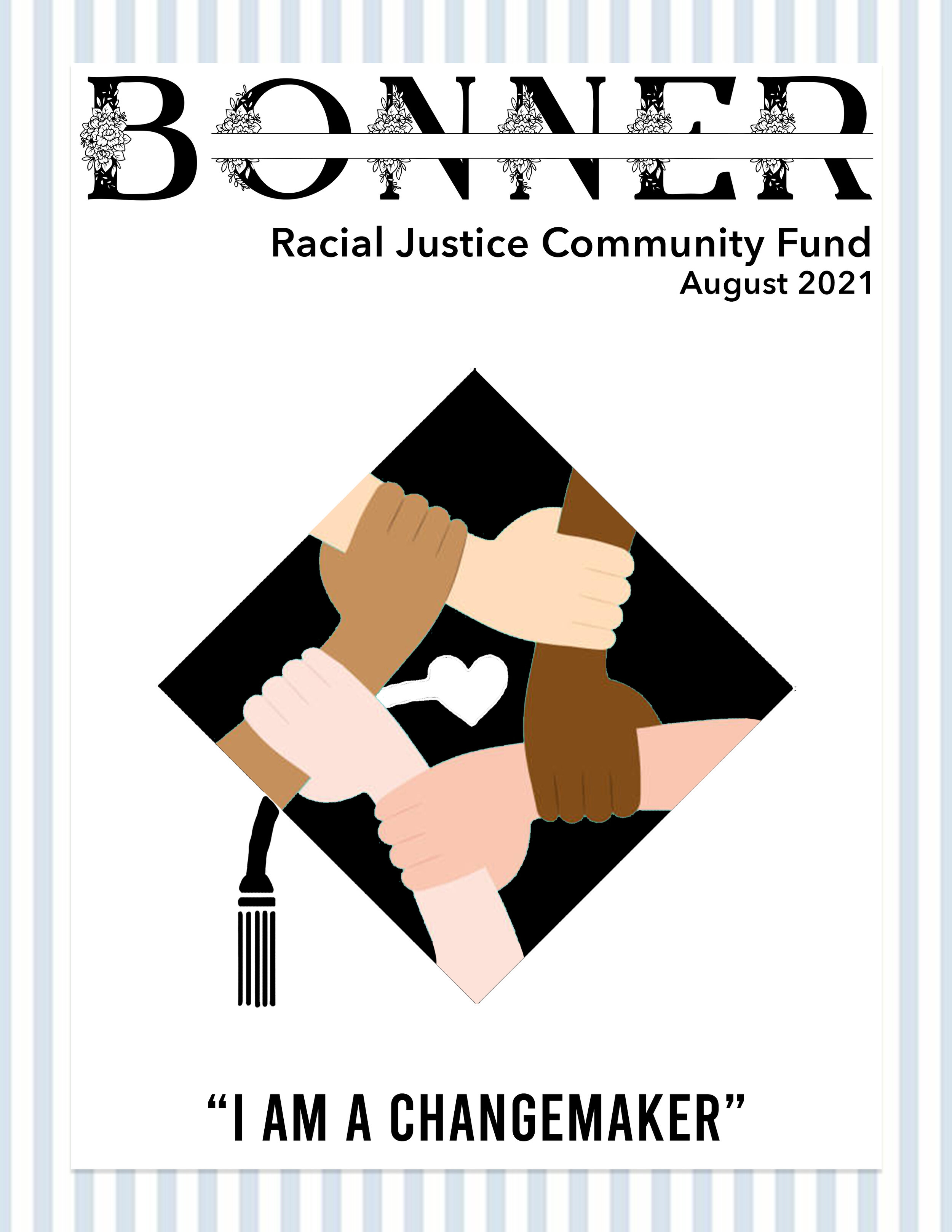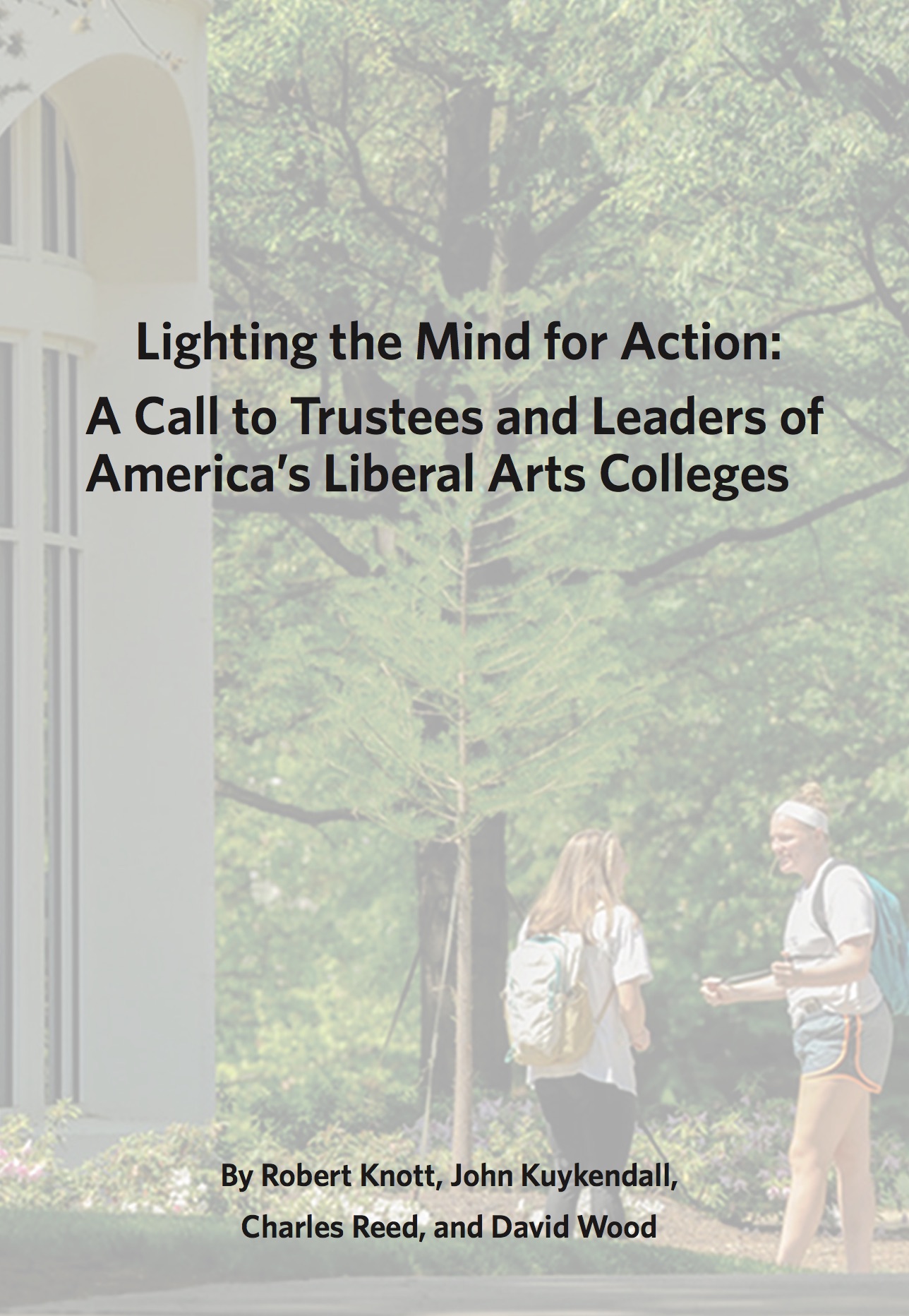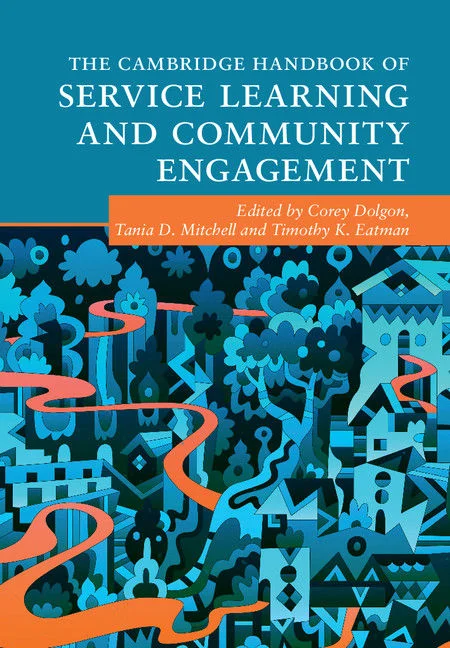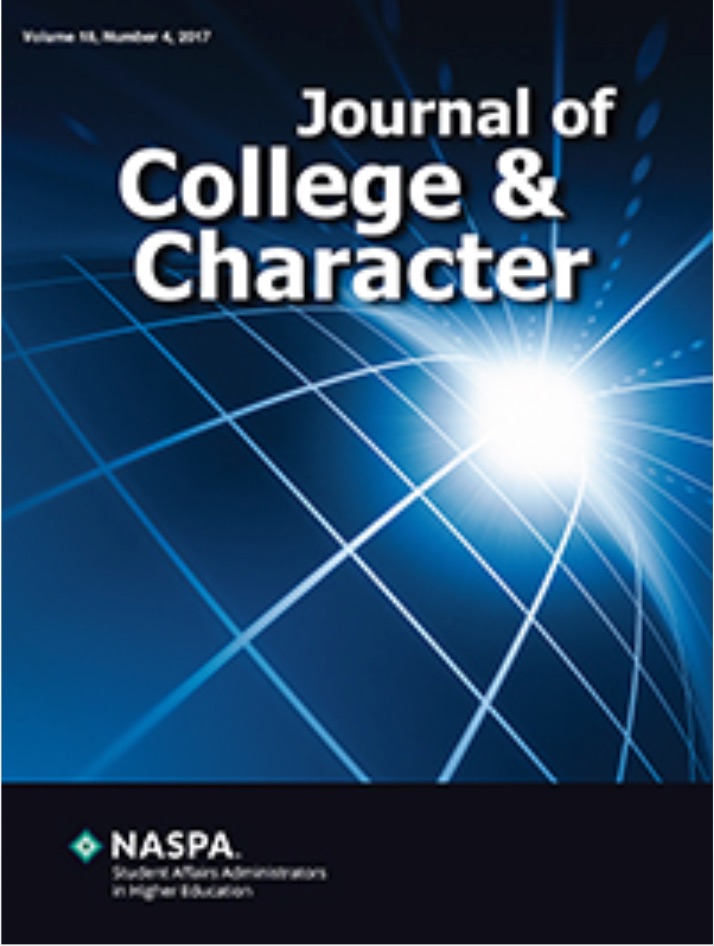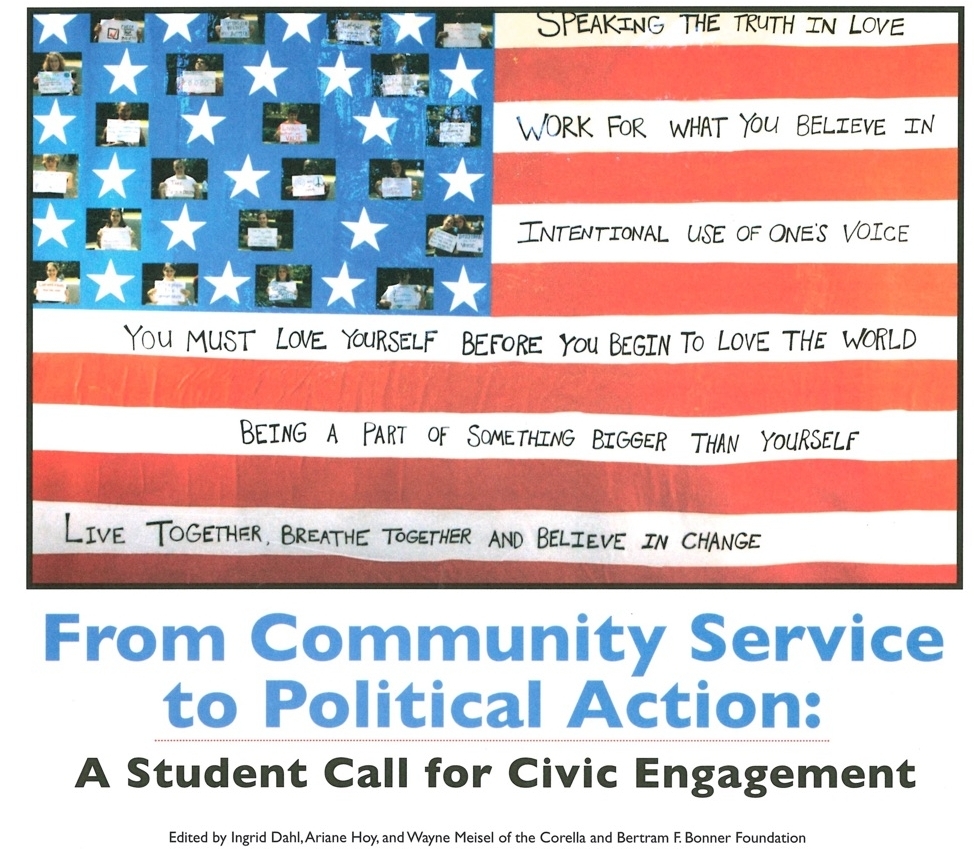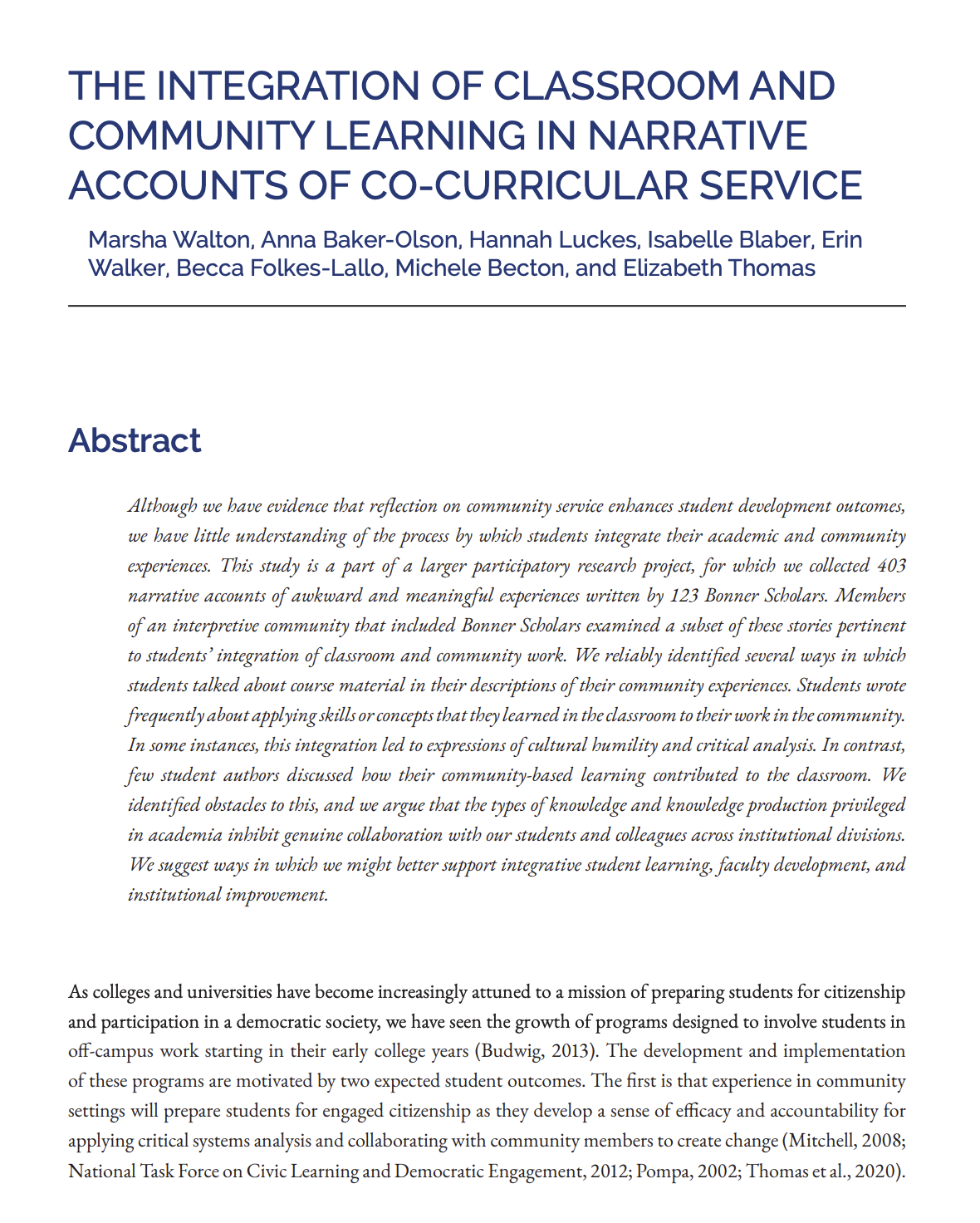Publications
For more than three decades, the Bonner Foundation has served as a national leader in advancing the field of community engagement in higher education. A wide network of students, alumni, staff, faculty, trustees, and partners have authored and contributed to an influential body of scholarship that has informed best practices in service-based learning, student development, and campus-community partnerships. These publications have been widely disseminated through partnerships with leading higher education organizations including the Association of American Colleges & Universities (AAC&U), Campus Compact, and Bringing Theory to Practice, journals, and publishers, establishing the Bonner Network as a catalyst for transformative change across hundreds of institutions nationwide.
Below are key publications that chronicle the evolution of the Bonner Program model and document its proven impact on students, campuses, and communities. Sequenced from most recent to oldest, these works demonstrate the Bonner Foundation's sustained role in pioneering research and development for the civic engagement field.
35 Years of the Bonner Program: Past, Present, and Future (2025)
Interview with Robert Hackett and Ariane Hoy, featured in Bringing Theory to Practice's "Bringing It" series
This feature article by Bobby Hackett, President, and Dr. Ariane Hoy, Vice President, reflects on the Bonner Program's 35-year history and its transformative contributions to higher education. The article highlights the Foundation's leadership in promoting community-based research and civic engagement curricular pathways, and its role in helping faculty and staff across the network publish books and resources with support from the Learn & Serve America Program (1997-2006) and the Department of Education's Fund for the Improvement of Post-Secondary Education (FIPSE). The synopsis and interview addresses current challenges in the field and articulates a vision for the future of civic engagement in higher education.
I AM A CHANGE MAKER: PROFILES FROM THE BONNER RACIAL JUSTICE INITIATIVE (2021)
By Sierra Medina and Joshua Perez, edited by Ariane Hoy, Rachayita Shah, and Arthur Tartee Jr.
The Bonner Foundation is pleased to release new stories and student profiles that showcase project work connected to the Racial Justice Initiative and Community Fund in 2020-2021. Over the summer of 2021, National Bonner Interns Sierra Medina and Joshua Perez conducted interviews with student leaders and administrators from most of the teams involved in the Bonner Foundation’s Racial Justice Initiative. Medina, a Bonner Scholar at Waynesburg College, especially leverage her skills and experience as a Communications and Journalism major, while Perez, a Bonner Leader at Rollins College, demonstrated his talent in graphic design. Together, Medina and Perez, and Foundation staff members Ariane Hoy, Rachayita Shah, and Arthur Tartee Jr. developed stories that documented the inspiring work at campuses and communities across the country.
Currently, these stories are introduced in an online format on the Bonner Foundation’s website here, with links to each story. They include profiles of the teams’ work at Mars Hill University, Rutgers University - Camden, Sewanee: The University of the South, Ursinus College, Washington & Lee University, and Widener University.
By Ariane Hoy and Maria Guevara Carpio
This short monograph features best practices and wisdom drawn from interviews with lead administrator and faculty members from ten institutions involved in two years of the Bonner Community-Engaged Learning Initiative. It involves the key themes and findings from interviews of Faculty Fellows and Administrator Leaders at ten of the institutions involved in the Bonner Community Engaged Learning Initiative in 2019-2021.
Foundation Community Engaged Learning Intern Maria Guevara Carpio (Rutgers University graduate ‘21) and Ariane Hoy, Vice President, conducted lengthy interviews with these key informants. The resulting themes present a foundation for a future volume with chapters that describe the work of campus-based teams of staff, faculty, partners, and students working to institutionalize and scale community engaged curriculum.
By Ariane Hoy, Rachayita Shah, and Ray Barclay
In 2020, the Bonner Foundation released this comprehensive report, which reflects implementation of the new Student Impact Survey across the national network in 2018 and 2019. The results represent learning from surveys completed by freshmen and seniors across all Bonner Programs. The report describes statistically significant positive findings of program participation on students’ educational attainment, development of identity, outcomes such as intercultural competence and respect for diversity, academic learning, career aspirations, democratic and political engagement, and post-graduate plans. It includes charts, narrative, and quotes from students’ survey responses. The report was shared nationally by the Association of American Colleges and Universities. Read more about the report, which also compares findings with current literature in higher education, here. This important report established empirical evidence that positioned the Bonner model as one of the most thoroughly documented approaches to student success through civic engagement in American higher education. Its national dissemination by AAC&U expanded the Foundation's influence in shaping institutional practices for integrating community engagement with student retention, belonging, and thriving.
SCHOLARSHIPS FOR CHANGE CASE STUDY
The Bonner Program is profiled in a new website, Scholarships for Change, created by Candid with financial support from the Ford Foundation and the Andrew W. Mellon Foundation.
Scholarships for Change is a first of its kind website that explores how donors are using scholarships as a force to accelerate the broader change they hope to see in the world. Created by Candid, it pulls together data and knowledge to tell the story of how philanthropic dollars are supporting scholars in their academic and professional journey, and guides funders in the practice of scholarship grantmaking.
The Bonner Program case study describes how “The Bonner Program takes a service-based approach to their scholarships, transforming the lives of scholars by providing them with new opportunities to serve their community.”
By Robert Knott, John Kuykendall, Charles Reed, and David Wood
This brief tract urges trustees and leaders of America's liberal arts colleges to knit your college back together again by returning to the liberal arts’ ancient goal that still prevailed in John Adams’ day – the goal of lighting students’ minds for ethical and civic action. "More than ever today," the authors argue, "America needs men and women who, by force of word and dint of character, offset the popular media, raise the level of public debate, and repair the civic fabric of splintered communities."
John Kuykendall, one of the co-authors, is President Emeritus of Davidson College and a current member of the Bonner Foundation Board of Trustees.
Pathways to Adult Civic Engagement: Benefits of Reflection and Dialogue across Difference in Higher Education Service-Learning Programs (2017)
By Dan Richard, Cheryl Keen, Julie Hatcher, and Heather Pease
This study, published in the Michigan Journal of Community Service Learning, explores the relationship between participation in college service-learning (SL) experiences, in both academic courses and co-curricular programs, and post-college civic engagement and behaviors. Using data from a purposeful sample of 1,066 alumni from 30 campuses who participated in the 20th Anniversary Bonner Scholars Study, researchers explored the extent to which these experiences during college were related to post-graduate civic-minded orientations, volunteering, and civic action. When evaluating various attributes of these programs (e.g., curricular, co-curricular programming, types and intensity of reflection, dialogue across difference, interactions with others), two components were particularly salient. Dialogue with others across difference was the strongest predictor of cultivating civic outcomes after college. In addition, both structured and informal reflection independently contributed to civic outcomes (i.e., civic-mindedness, voluntary action, civic action). This study introduced the Pathways to Adult Civic Engagement (PACE) model, which has become an influential framework for examining community engagement programming in higher education nationally. The finding that dialogue across difference is the strongest predictor of post-college civic outcomes has informed program design across numerous institutions beyond the Bonner Network.
Academic Support Organizations: Allies and Advocates for Community Engagement in Higher Education (2016)
By Amy Cohen, Ariane Hoy, and Julie Plaut
This chapter within The Cambridge Handbook of Service Learning and Civic Engagement edited by Corey Dolgon, Timothy Eatman, and Tania Mitchell focuses on the history and significance of organizations like the Bonner Foundation, Campus Compact, and Learn & Serve America in the national civic engagement movement. It describes the roles that external support organizations in the civic and higher education space have and must play to foster its continual success and reinvention.
Community Engaged Signature Work (2016)
Edited by Kathryn Campbell
The Bonner Foundation worked in partnership with the Association of American Colleges and Universities to produce an issue of AAC&U’s quarterly journal. The issue introduced the aspiration of Community Engaged Signature Work, a culminating integrative learning experience for undergraduates, but suggesting it could have a real-world civic impact. Articles by scholars and practitioners at Allegheny College, Emory & Henry College, Loyola University, Portland State University, and other institutions punctuated effective strategies for curriculum and institutional change. Ariane Hoy and Kathy Wolfe explore Community-Engaged Signature Work (such as through Bonner Capstones) as an effective High-Impact Practice. Ashley Finley and Bob Breason discussed the most current evidence for the value of civic engagement, which ties it to well-being and flourishing. Bonner alumni Katie Beck and Jonathan Franklin provided compelling examples of their own Signature Work and its impact on their future career choices.
The Bonner Foundation Celebrates 25 Years: Meet Our National Network (2015)
Edited by Ariane Hoy
This publication, created for the 25th Anniversary of the Bonner Program, highlights the achievements and programs at more than 65 colleges and universities that offer the Bonner Scholar or Bonner Leader Program. An introductory section provides an overview of the Bonner Program model, spotlighting student leadership, the intensity of the service experience, and related impacts on community capacity.
Each of the colleges and universities in the network and their centers for community engagement are profiled, with an overview of the institution’s mission, center for civic engagement, students in the Bonner Program, and unique community partnerships and campus programs, as well as photos. This is a great resource to learn more about the Bonner Network.
Engage: A Publication of the Bonner Foundation (2014)
Edited by Ariane Hoy
This online publication featured articles from a number of different authors reflecting on the accomplishments and emerging new directions of the Bonner Program’s work and civic engagement on campuses. For instance, Caryn McTighe Musil, Senior Vice President at AAC&U, reflects on the work of the Civic Learning and Democratic Engagement (CLDE) consortium and various initiatives to make civic learning and engagement deeper and more pervasive. Robert Hackett, President of the Bonner Foundation, shares reflections on the program’s founding commitments and the growing centrality for civic engagement. Carol Quillen, President of Davidson College, shares insights on the impact of the 25 year old program at her institution. Jamé Johnson of the Meadville school district and a partner to Allegheny College reflects on the transformative potential of collaboration through Bonner and the High-Impact Initiative. The issue highlights a number of ways in which community engagement has begun to reshape undergraduate education.
Deepening Community Engagement in Higher Education - Forging New Pathways (2013)
Edited by Ariane Hoy and Mathew Johnson
Deepening Community Engagement in Higher Education discusses how colleges and universities can increase the engagement of their students, faculty, and institutional resources in their communities. This volume features strategies to make civic engagement deep, pervasive, integrated, and developmental – qualities that must be demonstrated by campuses for successfully gaining the Carnegie Community Engagement Classification. Chapters by leaders, faculty, and practitioners from more than a dozen colleges and universities (including Allegheny, Bates, Berea, Emory & Henry, Oberlin, TCNJ, and Washburn) and scholars from the Bonner Foundation, CIRCLE, and NERCHE describe new frameworks and strategies for student development, community partnerships, and campus infrastructure. Authors include Ariane Hoy, Abby Kiesa, Mathew Johnson, John Saltmarsh, and Marshall Welch. Chapters share best practices for engaging faculty, for integrating social media to advance engagement, for long-term strategic planning that links civic work to institutional mission, and for high-impact civic engagement. This volume became a cornerstone resource for institutions pursuing the Carnegie Community Engagement Classification, with its frameworks for making civic engagement 'deep, pervasive, integrated, and developmental' widely adopted as benchmarks for institutional assessment and strategic planning.
Disciplining Higher Education for Community Engagement in The Engaged Campus: Certificates, Minors, and Majors as the New Community Engagement (2012)
By Robert Hackett, Ariane Hoy, and Mathew Johnson
As of 2012, there were more than 50 minors, certificates, and academic programs designed around civic engagement. The Engaged Campus, a volume edited by Dan Butin, offers a set of emerging best practices and articulation of critical issues for faculty and administrators committed to developing, strengthening, or expanding majors or minors in community engagement at their respective institutions. The Bonner Foundation served as a front-runner in the development of civic engagement academic degree programs through its work with colleges and universities involved in the 2004-2008 FIPSE Initiative. This chapter draws on that knowledge and practice. The respondent chapter within the volume, “Disciplining Higher Education for Community Engagement” argues that the conventional form of service-learning courses must be augmented through a sustained, scaffolded experience tied to both curricular and co-curricular engagement.
Articulating a Vision: Presidential Statements on the Future of Service in Higher Education (2010)
Edited by Wayne Meisel and Robert Hackett
Published to mark the 20th Anniversary of the Bonner Program, this publication includes visionary statements about the value and integration of community engaged learning and action by the presidents at 43 colleges and universities in the Bonner network. Represented are statements from institutions as diverse as Amherst College, Berea College, the College of Charleston, Earlham College, Macalester College, Morehouse College, Notre Dame de Namur University, Stetson University, The College of New Jersey, Ursinus College, and Washington & Lee University, amongst others. These presidents discuss the impact of the Bonner Program and building a culture of civic engagement on their institutions. As Elaine Hanson, President of Bates College founded in 1850 by abolitionists, wrote, “The Bates-Bonner connection, then, has me looking forward and backward, looking at both our roots and our routes. It offers Bates a new terrain on which to recommit ourselves to our founding values – and in the process, it pushes us to live those values in new ways.”
What’s the Big Idea?: Students Building a Better World (2010)
Edited by Bonner Foundation Staff
Prepared for the 20th Anniversary Celebration of the Bonner Program held at Berea College, this volume features "big ideas" proposed and carried out by every Congress Representatives to improve their campus program and the communities in which they serve. The work behind each of these big ideas is nothing short of inspirational. This booklet is the culmination of hundreds, if not thousands, of brainstorms, action plans, teams, and collaborations, that have come together to produce beautiful and powerful outcomes. The “Big Ideas” have proven not only to serve as more tangible goals for student leaders serving as Bonner Congress Representatives, but also as the motivation and framework to do incredible work on our campuses and communities.
Engaging with Difference Matters: Longitudinal Student Outcomes of Co-Curricular Service-Learning Programs (2009)
by Cheryl Keen and Kelly Hall
This article presents the findings from a seven year longitudinal study of college students in the Bonner Scholar Program across 25 colleges and universities. It draws on data gathered through the pre-, mid-point, and end-point Student Impact Surveys, designed to gauge the impacts of four years of involvement on desired college outcomes. Outcomes examined included values, civic behaviors and citizenship, leadership, diversity and dialogue across difference, with clear positive impacts in all of these areas. This study’s findings suggest that the core developmental experience of service is augmented by sustained education, reflection, and dialogue across boundaries of perceived difference that happens with people students serve, with the people they serve alongside of, with their supervisors at the service site, with the college staff and faculty, and, centrally, with their peers. This study affirms the powerful impacts of developmental multi-year community service experiences on students’ learning and success during and after college.
Post-Graduation Service and Civic Outcomes for High Financial Need Students of a Co-Curricular Service-Learning College Program (2008)
by Cheryl Keen and Kelly Hall
This article also shared findings from the seven-year longitudinal studies of the impact of Bonner Program participation on students and graduates. High financial need Bonner scholarship alumni, who had been engaged in four years of co-curricular service and reflection experiences, were surveyed six years after graduation. Survey questions drawn from UCLA’s Life After College Survey allowed comparison with three national groups. All Bonner service-learning program graduates were still doing community service six years after graduation compared to approximately two-thirds of each comparison group. Alumni were more also likely than comparison groups to be civically engaged, particularly in activities requiring dialogue. The importance of sustained dialogue across boundaries of difference is discussed.
Civic Engagement at the Center: Building Democracy through Integrated Co-curricular and Curricular Experiences (2008)
by Ariane Hoy and Wayne Meisel
In 2004, the Bonner Foundation began work with 15 campuses to create a model for civic engagement minors, concentrations, and academic programs, with support from the U.S. Department of Education and its Fund for Improvement of Post Secondary Education (FIPSE). In 2008, Civic Engagement at the Center captured this model. Moreover, the monograph shared the broader Bonner student developmental model and its potential for enhancing students’ civic learning and socially responsible leadership to a national higher education audience. First, the monograph describes key elements of the Bonner Program’s developmental co-curricular model, drawing on research about its impact on students. Then, it introduces the architecture of emerging civic engagement minors, certificates, and academic programs, drawing on the common elements from programs at fifteen colleges and universities. Additionally, lessons learned about the process of developing and approving such academic programs are shared.
Student leadership: making a difference in the world (2006)
Written in conjunction with the Bonner Foundation’s work on a model for civic engagement minors, certificates, and academic programs, this issue of AAC&U’s Diversity Digest featured articles from staff, faculty, leaders, and students across the network. The issue was perhaps the first time that the Bonner Program model was highlighted in a national higher education publication. Articles describe the four-year developmental model for students and capacity building community partnerships. They also showcased its value and strategies for faculty engagement, institutional change, and curriculum transformation. Leaders like Elizabeth Paul, former faculty member at TCNJ, provost at Stetson and president at Nazareth College, share a faculty perspective on the value of the model. Alumni like Matt Morton, who went on to complete a Rhodes Scholarship and doctoral degree in evidenced-based practice influenced by his Bonner experience, discusses the lifelong impact of the Bonner Program. Foundation staff, especially Ariane Hoy, worked closely with AAC&U and Caryn McTighe Musil to produce the issue.
From Community Service to Political Action: A Student Call for Civic Engagement (2004)
Edited by Ingrid Dahl, Ariane Hoy, and Wayne Meisel
This publication was designed as a tool for enhancing education and reflection, especially on civic and political engagement, within the Bonner Program and campus-wide contexts. This Bonner Foundation resources was designed to deepen students’ civic, democratic, and political learning, especially so that they would be involved in elections, advocacy, and broader citizen involvement. The book features nine chapters exploring a number of themes such as identity, family influences, social justice, poverty, voting, public policy, advocacy, international experiences, and connections between service and academic study. Each chapter includes short essays that highlight such themes written by students in the Bonner Scholar and Leader Program. Students from 32 colleges and universities are featured. Additionally, reflection exercises, videos, books, and other educational materials are provided for each theme.
Community-Based Research and Higher Education (2003)
Edited by Kerry Strand, Sam Marullo, Nick Cutforth, Randy Stoecker, and Patrick Donohue
Community-Based Research and Higher Education: Principles & Practices describes how to incorporate a powerful and promising new form of scholarship into academic settings. The book presents a model of community-based research (CBR) that engages community members with students and faculty in the course of their academic work. Unlike traditional academic research, CBR is collaborative and change-oriented and finds its research questions in the needs of communities. This dynamic research model combines classroom learning with social action in ways that can ultimately empower community groups to address their own agendas and shape their own futures.
Community-Based Research and Higher Education is written by five engaged scholars from different disciplines with extensive experience in community-based research as teachers, researchers, administrators, scholars, and community activists. They draw on their own and others' experience to develop concrete guidelines for creating and sustaining partnerships through CBR projects as they also outline the principles that guide decisions about research design and methods. The authors provide extensive practical suggestions for incorporating CBR into courses and curricula. This publication helped establish community-based research as a distinct scholarly approach in higher education, influencing the development of CBR programs and centers at universities nationwide and shaping tenure and promotion guidelines to recognize community-engaged scholarship.
Community-Based Research (Summer 2003)
Edited by Kerry Strand, Sam Marullo, Nick Cutforth, Randy Stoecker, and Patrick Donohue
This special edition of the Michigan Journal of Community Service Learning was a product of two Learn & Serve America grants awarded by the Corporation for National and Community Service to the Bonner Foundation from 1997 to 2003. Articles in this volume include: Principles of Best Practice for Community-Based Research by the editors; Opportunities and Pitfalls of Community-Based Research: A Case Study; Negotiating Community-Based Research: A Case Study of the "Life's Work" Project; The Student's Role in Community-Based Research; Community-Based Research Networks: Development and Lessons Learned in an Emerging Field; Community-Based Research Assessments: Some Principles and Practices; and Community-Based Research: Celebration and Concern.
A Journey of Faith (2002)
This short publication was a tribute to Mrs. Corella Allen Bonner, principal funder of the Bonner Foundation, to celebrate her life and passing.
A Journey of Faith captures a slice of Corella’s history growing up in the Appalachian coal mining towns of Kentucky and West Virginia, then moving to Detroit where she met Bertram F. Bonner.
The booklet includes several moving tributes given by students, staff, and college leaders at her memorial service in 2002. It is an important piece of the Foundation’s archival history, speaking also to its early commitment to establish Bonner Scholar Programs at colleges and universities throughout the Appalachian region.
Not Merely a Duty (2000)
By Wayne Meisel
This book showcases student reflections on what it means to be a Bonner Scholar, featuring quotes collected from more than 1,500 students across 25 colleges and universities. It begins with two short chapters that describe the Bonner Scholar and Leader Program model and its goals and core frameworks including providing an “Access to Education, Opportunity to Serve,” and to “Change the Count” by making an impact on the capacity of local community organizations and issues.
Chapters present quotations from Bonner students about their programmatic experiences, their learning on issues spanning HIV/AIDS to working with youth, and their personal growth through overcoming challenges and adversity. The book is filled with inspiring reflections from students.
Catalyzing Broader Scholarship
The Bonner Network's influence extends through the scholarly contributions of faculty and staff at member institutions. For instance, many of the faculty members who become campus leaders in promoting institutional change, integrating place-based learning, and in addressing pressing community issues through their teaching, service, and research also pursue writing. Their publications demonstrate how their involvement with the program, network, and ongoing community engagement has catalyzed research and innovation across diverse contexts. See, for instance, the article below, published in the Michigan Journal of Community Service Learning.
The Integration of Classroom and Community Learning in Narrative Accounts of Co-Curricular Service (2022)
By Marsha Walton, Anna Baker-Olson, Hannah Luckes, Isabelle Blaber, Erin Walker, Becca Folkes-Lallo, Michele Becton, and Elizabeth Thomas (Rhodes College)
Published in the Michigan Journal of Community Service Learning, this participatory research study examined 403 narrative accounts from 123 Bonner Scholars to understand how students integrate their academic and community experiences. The research reliably identified several ways students apply classroom skills and concepts to community work, with findings showing frequent expressions of cultural humility and critical analysis. This study contributes important insights into the pedagogical processes that support integrated learning in co-curricular service programs.


